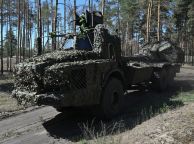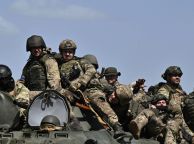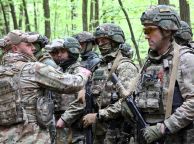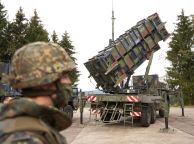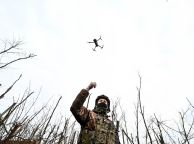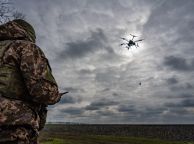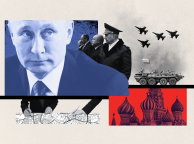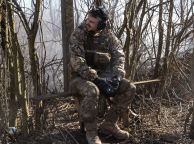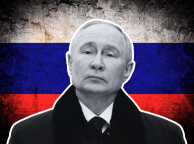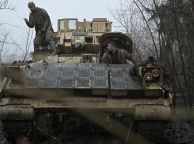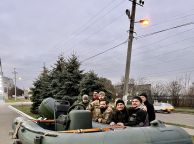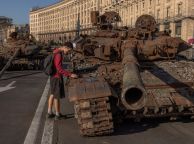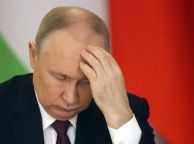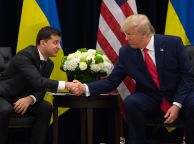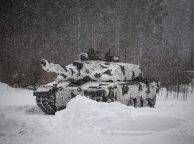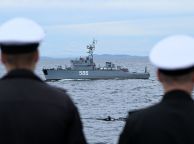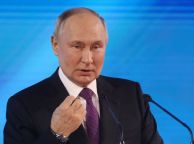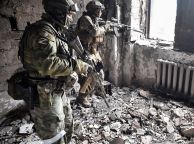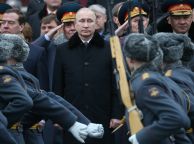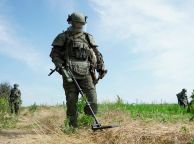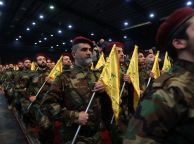By David Brennan
Kyiv is rushing reinforcements to the embattled fortress city of Avdiivka, with Ukrainian commanders and observers alike warning of the deteriorating battlefield situation around the frontline settlement.
Russian forces have been pressing a grinding offensive against the city for several months, seeking to encircle and capture it despite reportedly massive losses in personnel and equipment.
Avdiivka is located on high ground in Donetsk Oblast, on the outskirts of Donetsk City which since 2014 has been at the heart of the Kremlin's efforts to dismember Ukraine. Avdiivka has been devastated by the Russian offensive, Moscow's forces making slow and costly gains as they did in the battle of Bakhmut.
And as at Bakhmut, Ukraine has committed to defending Avdiivka and inflicting as much damage on the advancing Russian formations as possible.
"The main goal is to force Russia to pay as much as possible for capturing this location," Ivan Stupak, a former officer in the Security Service of Ukraine (SBU) and now an adviser to the Ukrainian parliament's national security, defense and intelligence committee, told Newsweek. "But at the same time, we've also got very severe casualties from our soldiers."
Andrii Kramarov, a military expert and former officer in the Ukrainian armed forces, told Newsweek: "It's our strategy there, that Russian losses are much higher than ours."
"If our losses become equal, it would be a situation that we would need to move out of Avdiivka."
Saving Avdiivka
This week, fresh reports emerged of Ukrainian reinforcements being rushed to the strategic salient, which enjoys wide fields of vision and fire over the surrounding area.
"We don't have enough capability to hold the city, but reinforcements are coming, and we're counting on friendly units," Ivan Sekach—a spokesperson for the 110th Brigade, a unit which has been fighting in Avdiivka for almost two years— told Radio Liberty on Tuesday.
The formations dug in at Avdiivka for almost two years are "extremely exhausted," Stupak said. "They need rest." Fresh units—according to Forbes perhaps including the 3rd Assault Brigade—could help ease the strain. But the overall picture for Avdiivka remains grim.
The Institute for the Study of War's Tuesday evening update noted reports among pro-war Russian military bloggers indicating advances in northern, southern, and central Avdiivka in recent fighting.
Newsweek cannot verify the reports and has contacted the Russian Defense Ministry by email to request comment.
"We could lose the city within this month," Stupak said, suggesting a Ukrainian withdrawal like that conducted in Bakhmut and Marinka might be required. "The situation is critical because they've almost encircled our forces. It's very bad, and it's very similar to Bakhmut."
Kramarov said the fight is tough but not lost. "Due to lack of artillery, we unfortunately can't hold positions," he said, noting that deadly FPV drones have been vital for the shell-starved defenders.
"In a military context, you can't take part without a powerful artillery shield, you can't hold positions, especially when the Russians are now in Avdiivka," Kramarov added.
Recent Russian advances have opened "two breaches" in Ukrainian lines in the northeast and southeast of the city, Kramarov added.
"The situation is harsh, yes, but we are engaging in defense. We haven't lost Avdiivka, we aren't now leaving Avdiivka. The moment when we need to leave the city will be a moment when we can't take much more...The situation is not a disaster, it's a very, very harsh battleground for now."
Enter the 'Butcher'
Ukraine's new commander-in-chief—Oleksandr Syrskyi, appointed to replace Valery Zaluzhnyi last week—has expressed concern. "The enemy is now on the offensive practically along the entire frontline," Syrskyi told German broadcaster ZDF in an interview recorded shortly before his promotion. "We have moved from offensive actions to conducting a defensive operation."
On Wednesday, Syrskyi visited Avdiivka and the frontline Kupiansk region along with Defense Minister Rustem Umerov. "The operational environment is extremely complex and stressful," Syrskyi wrote on Telegram. "The Russian occupiers continue to increase their efforts and have a numerical advantage in personnel. They do not count on losses and continue to use the tactics of 'meat assaults'."
"A number of important decisions were made aimed at strengthening the combat capabilities of our military units and preventing enemy actions," Syrskyi said following the frontline visit.
Avdiivka is an intensely political battle for both sides. Russian President Vladimir Putin wants a rare battlefield victory ahead of the March presidential elections. "They have to show before election day that the Russian army is powerful," Stupak said.
President Volodymyr Zelensky, meanwhile, needs to show his people and his Western partners that Ukraine can still fight tough battles and inflict severe losses on Russia. Kyiv's war effort is somewhat in limbo at the two-year mark, and further defeats will undermine Zelensky's desperate calls for more military aid.
Zelensky's decision to fight for Bakhmut despite horrendous casualties was controversial. The battle was overseen by Syrskyi, earning him the nickname "Butcher" among some soldiers.
Syrskyi has also been credited with masterminding the successful defense of Kyiv in the opening months of the war, and the lightning offensive that liberated swathes of Kharkiv region in fall 2022. Before the full-scale invasion, Syrskyi spent eight years fighting the Moscow-directed separatist uprising in the eastern Donbas region.
"He's very well experienced," Kramarov said. "In such a long war, it's very important to put fresh blood in command...We have very good new generals from a new generation."
The president and his new top commander appear set on another fighting defense in Avdiivka. "Only time will tell who was right and who was wrong," Stupak said.
